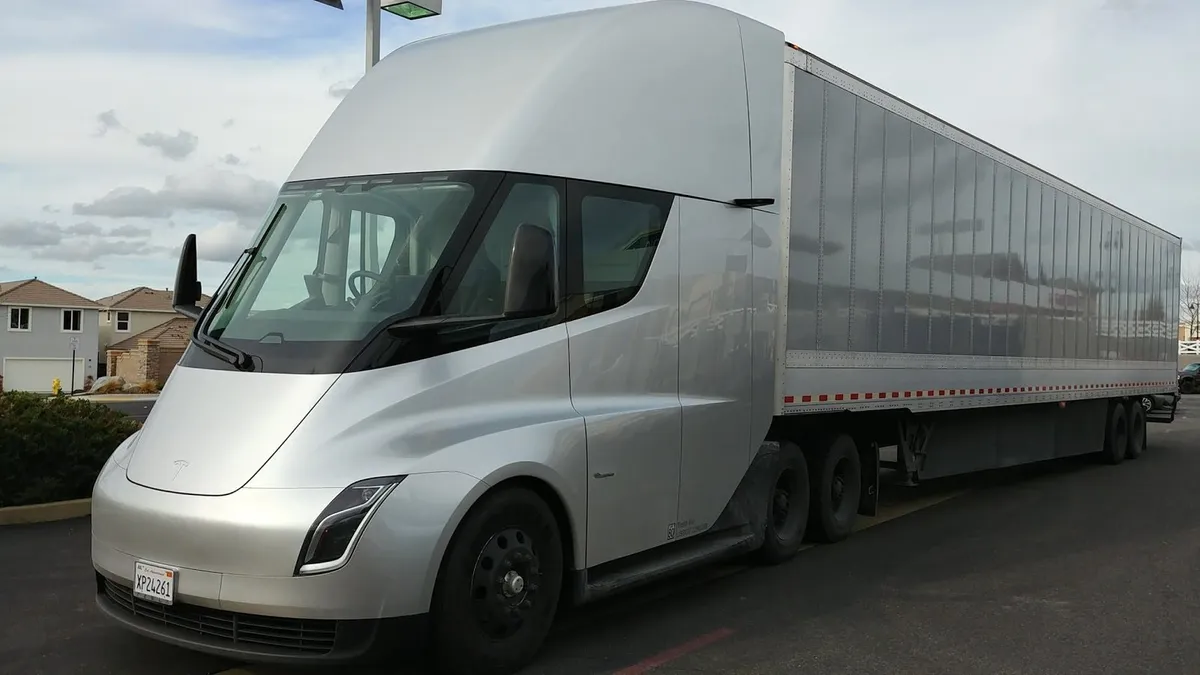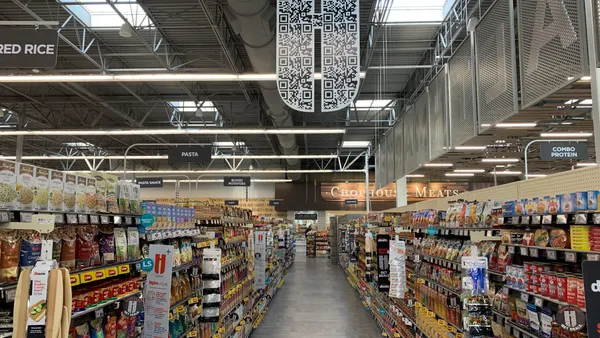Dive Brief:
- Albertsons said it is adding 10 all-electric Tesla Tractors to its Southern California fleet in an effort to reduce carbon emissions and run a cleaner transportation program. The announcement followed the release of the grocer’s 2018 Sustainability Plan that showcased Albertsons' ongoing efforts to reduce waste, expand organic options, lead in seafood sustainability and support causes its customers feel passionate about.
- Albertsons is one of several retailers who are turning to alternative power to reduce transportation costs while improving freight efficiency and environmental performance. The company has more than 1,400 trucks serving its 2,300 stores across the country.
- “Advancing supply chain efficiency and sustainability is an important goal for our company,” said Tom Nartker, Albertsons' vice president of transportation. “We’re excited to pilot this expansion of our transportation program with trucks that help us limit our overall carbon footprint.”
Dive Insight:
Albertsons is already a partner of the Environmental Protection Agency’s SmartWay transportation program. The grocer actively promotes SmartWay certification to improve freight efficiency and environmental performance.The addition of 10 electric vehicles furthers that mission.
Tesla unveiled its semi truck last summer and expects them to be “in production” in 2020. Tesla CEO Elon Musk has said the trucks give drivers a better experience while increasing safety and reducing costs. The trucks will have built-in connectivity with a freight management system that allows for routing and remote monitoring. The Tesla Semi will be able to go 500 miles on a single charge.
One of the bigger selling points is that the Tesla Semi will be able to go from 0 to 60 miles per hour in five seconds with an empty trailer and in 20 seconds with an 80,000-pound load. That means they cover more distance in less time than a diesel truck, saving money in the process. Estimates say a Tesla Semi will operate at $1.26 per mile versus $1.51 per mile for a standard diesel truck. The average number of miles driven each year by a large truck is just over 100,000, according to industry analysts. That means each Tesla Semi could save a company at least $25,000 a year.
The upfront costs are higher. A Tesla Semi will cost between $150,000 and $200,000 depending on the model. It will cost less to maintain as fewer components will require regular maintenance. A diesel semi usually starts around $80,000 but can go above $200,000 depending on features such as sleeper cars, higher capacity and horsepower.
Albertsons is not the first retailer to opt for electric vehicles. Walmart put an order in for 10 in 2017 and recently upped that to 30 more in September. The majority of the latter order will go to Canada where Walmart plans to rely exclusively on alternative power for its fleet by 2020. Anheuser-Busch already ordered 40 Tesla Semis and has recently ordered 800 Nikola Semis, Tesla’s main competitor in the electric fleet area. Anheuser-Busch plans to convert all of its long-haul dedicated truck fleet to renewable energy by 2025.
As more companies set green and sustainable goals, changing from diesel to electric could be a significant way to reduce costs and carbon footprints despite the high price to enter the market. These changes are also about more than costs, they are a way to appeal to younger consumers. A 2017 study by The Shelton Group found 70% of millennials consider a company's environmental practices when making purchasing decisions. Going green will likely translate to more green for retailers down the road.
Albertsons' decision to add the Tesla Semi to its fleet is a logical move. It not only will save the company money but it could work as a selling point to lure customers who care about the environment and sustainability into its stores. It may not be the only reason people shop at Albertsons, but it could give the grocer something it can use to promote in stores, online or in mailers. Electric vehicles like these are slowly being adopted by businesses like Albertsons, but as more companies discover the benefits, the technology improves and the costs potentially come down, expect more retailers to replace trucks in their gas-guzzling fleet.












